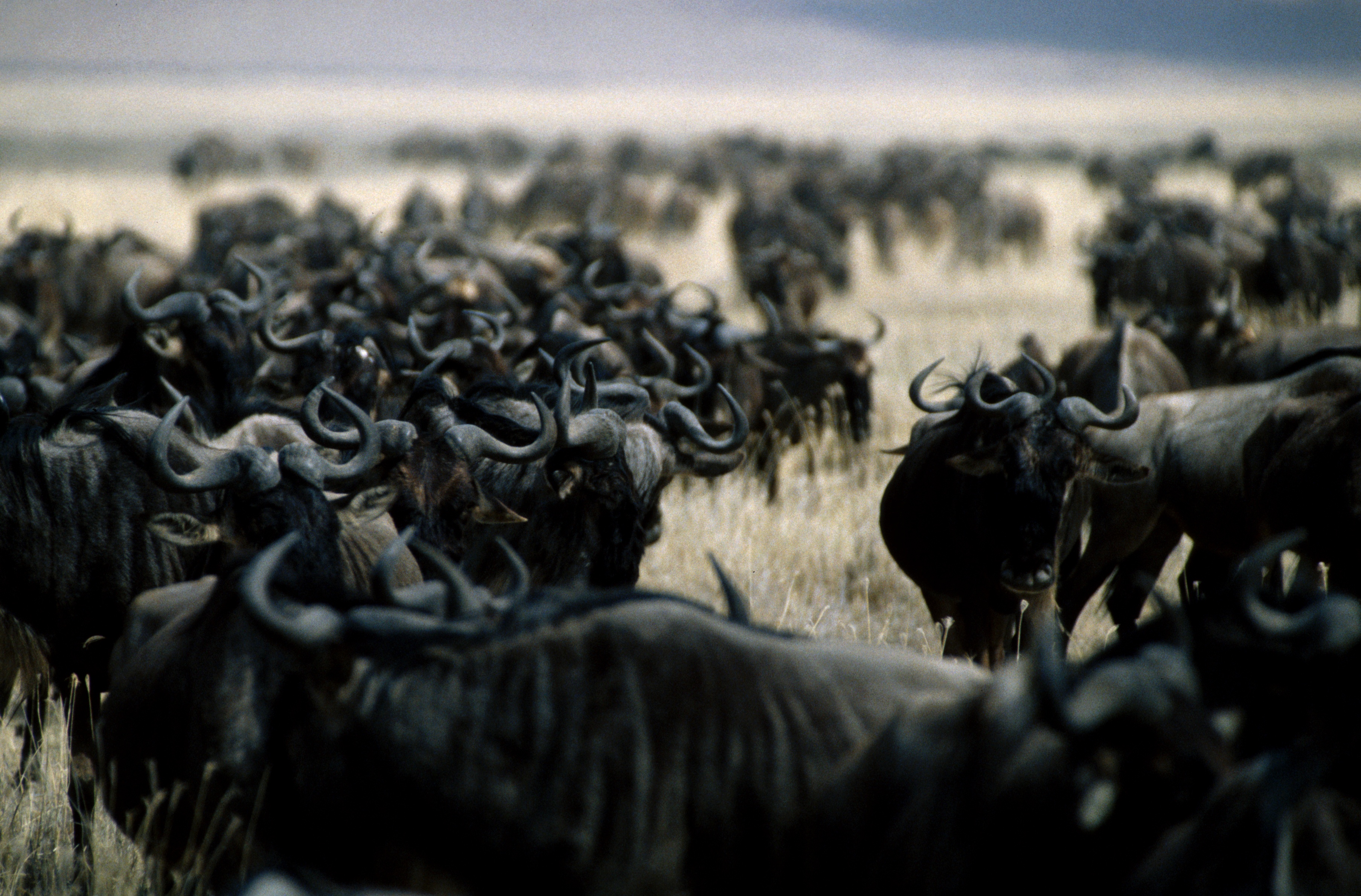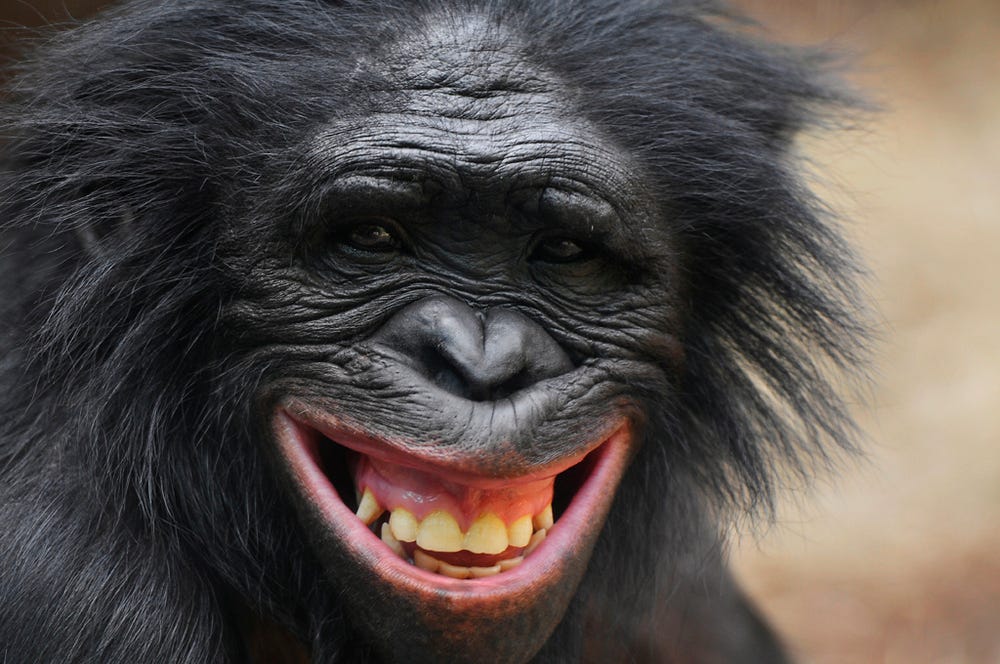
Wiki / Tiere
Inhaltsverzeichnis: (verbergen)
 |
|
Die Tiere empfinden wie der Mensch
|
Die DNS von Säugetieren ist auf Demokratie ausgerichtet, ihr Entscheidungszentrum im Gehirn ist demokratisch.
Alphahirsche entscheiden nicht für die Herde, sie haben lediglich die Wahl hinsichtlich ihrer sexuellen Vorliebe.

Die Biologen Dr. Timothy J. Roper und Dr. Larissa Conradt von der Universität Sussex in Cornwall, England, führten eine Studie über die Entscheidungsfindung in Tierherden durch.
Demokratische einfache Mehrheitsentscheidung von 51%
Demokratische Zwei-Drittel-Mehrheitsentscheidung
von 66% bei Gefahr
Diese demokratischen Wahlmuster sind im gesamten biologischen Spektrum anzutreffen, von Insekten bis hin zu den Orangutans. Alle Herdenmitglieder entscheiden anhand der von ihnen geäußerten Verhaltensanzeichen.
| Quellen (engl.): ► Dr. Timothy J. Roper, britischer Biologe, Dr. Larissa Conradt, britische Biologin, Consensus decision making in animals [Gruppenabgestimmte Entscheidungsfindung bei Tieren], Fachbereich für Biologie und Umweltwissenschaften, Universität von Sussex, Brighton, United Kingdom, präsentiert von The Human Condition, presented by the large database of scientific and medical research ScienceDirect, volume 20, 8. August 2005 ► Dr. Larissa Conradt, britische Biologin, Christian List, Group decisions in humans and animals: a survey, Fachbereich für Biologie und Umweltwissenschaften, Universität von Sussex, Brighton, United Kingdom, präsentiert von der wissenschaftlichen Fachzeitschrift herausgegeben von der britischen Royal Society Philosophical Transactions of the Royal Society, 12. Dezember 2008, 27. März 2009 |
| Source: ► Dr. Timothy J. Roper, British biologist, Dr. Larissa Conradt, Britih biologist, department of biology and environmental science, University of Sussex, Brighton, United Kingdom, Democracy in animals: the evolution of shared group decisions, presented by the Proceedings of the Royal Society B, 274(1623), S. 2317-2326, published online 20. July 2007, 22. September 2007 |
| Siehe auch: ► Kollektive Weisheit und ► Politik |
| See also: ► Democratic group decision-making in herd animals |
Persönliche Bekenntnisse
Hesses Hausbesorgerin beobachtete: Wildvögel näherten sich Hermann Hesse.
Empfehlungen
Schlussfolgerungen
Einsicht

Kooperation und gegenseitige Hilfe sind ein zentrales Element im Verhalten von Menschen und Tieren.
Siehe auch: Studien des deutsch-russischen Biologen Karl F. Kessler zur gegenseitigen Hilfe unter Vögeln in Osteuropa
|
Literaturzitate
Gedichte
Personal avowals
Historic leaders who were great horsemen dealt with aggressive, challenging stallions without resorting to violence or panicking but taking the non-predatory teachings from the horse: Buddha, Alexander the Great, Genghis Khan, Joan of Arc, Catherine the Great, George Washington, Geronimo, Winston Churchill, Ronald Reagan.
⚡ Churchill, ⚡ Roosevelt, and ⚡ Stalin met in order to talk about Europe's Post War reorganization. When Roosevelt left
the room during a break Stalin turned to Churchill and made a comment about FDR being a pig.

Recommendations
Conclusion
Future prospect
See Principle 3:1
Animals (all mammals, birds, and even the octopus) are conscious and aware to the degree that humans are.
[*]The task of the "new man" (in 4th density) is to fill the breach in creation and reunite the lower and higher levels, to reconcile both aspects of creation: the first 3 first levels are "more" material and created by the higher levels. The last 3 levels are less material and endowed with creative abilities.
Altruism research: "This new science of altruism and the physiological underpinnings of compassion is finally catching up with Darwin’s observations nearly 130 years ago, that sympathy is [humanity's] strongest instinct." Dacher Keltner, Ph.D. (*1962) US American professor of psychology, University of California, Berkeley, altruism researcher, director of the Greater Good Science Center, author, cited in: removed article 'Survival of the Kindest' – Sympathy is Strongest Human Instinct, presented by the publication impactlab.com, 9. December 2009
Men are a profoundly social and caring species.
Newton and Descartes offered the first scientific mechanical creation story.
Thomas Malthus, a chief economist, coined the idea 'We are doomed to an endless struggle in scarcity', a rationale for the East India Company to steal from the world.
The original theory of evolution goes back to Darwin's grandfather. Darwin who had adopted the Malthusian model of scarcity had observed competition and cooperation in nature. In his evolutionary theory he had to subvert the cooperation part as it didn't fit the scarcity theory.
Study on group decision-making in animals, University of Essex in Cornwall, England: British biologists Roper and Conradt concluded: The alpha deer has only sexual preference choice. The herd makes a majority democratic decision where to graze next. Democracy is wired into the brains of creatures.
Confirming animal hierarchy ⇔ heterarchy: Life itself is the ultimate context and power whereby evolution unfolds "unfairly", for like a cork in the sea, excellence automatically rises to the top. The strongest lion dominates, the cleverest sea urchin survives. The smartest octopus gets to be the biggest, and the fastest runner wins the race. ⚡ Dr. David R. Hawkins, Truth vs. Falsehood, S. 216, 2005
|

Literary quotes
Poems
| |||||||||||||||||||||||||||||||||||||||||||||||||||||||||||||
| Literature: ► Bruce H. Lipton, Ph.D. (*1944) US American developmental new cellular biologist, former associate professor, University of Wisconsin School of Medicine, presaged the field of epigenetics [mechanism by which nurture controls nature], lecturer, author, Steve Bhaerman, co-author, Spontaneous Evolution. Our Positive Future (and a Way to Get There from Here), Hay House, 28. September 2009 |
| See also: ► Evolution and ► Evolution of human consciousness ► Information Age ⇒ Conceptual Age ⇒ Changing expressions of creativity – Daniel Pink |
Empathy is expressed via two channels:
Dutch Primatologist Frans de Waal, Ph.D. (1948-2024) performed a "Fairness study" on benign, self-aware animals. He
and his colleague Sarah Brosnan tested the sense of altruism and morality with chimpanzees (apes), dogs and birds, and elephants.
Note on the mirror self-recognition: Next to humans do great apes, dogs, elephants, European magpies (birds), individual owls, bottlenose dolphins, orcas, have the ability to recognize themselves in the mirror.
When two capuchin monkeys – coopeative by nature and considered as the most intelligent New World monkeys – each received a cucumber treat, they performed the requested task in the lab many times in a row. If one of them was rewarded with higher valued grapes and the other one merely with cucumber – the latter felt cheated and soon started to protest by either refusing to further comply or
to eat the cucumber.

Monkeys will accept and eat a piece of cucumber whenever they receive it, but not when they witness their partner getting a better deal. This reaction known as "inequity aversion" refutes the theory of profit-maximizing under all circumstances made by economy theorists who claim that greedy humans would invariably take whatever they can get.
Book review: Our Inner Ape: A Leading Primatologist Explains Why We Are Who We Are, presented by The Science Shelf, Fred Bortz, 21. November 2013
| Sources featuring Frans de Waal, Ph.D. (1948-2024) Dutch US American Candler professor of psychology and primate behavior, director of Living Links, Yerkes National Primate Research Center, Emory University, Atlanta, Georgia, biologist, ethologist, speaker, author ► Q&A Frans de Waal Answers Your Primate Questions, presented by the publication Freakonomics, 7. May 2008 ► Video presentation Moral behavior in animals, presented by TEDx Peachtree Talks, minute 13:11, 16:34 minutes duration, filmed November 2011, posted April 2012 |
| See also: ► Empathy and ► Politics and ► Compassion and ► Ethics |
| Source: ► Article WWF: Half the world's wildlife gone over last 40 years, presented by the daily US American newspaper Chicago Tribune, Tom Miles, 30. September 2014 |
| Reference: ► Statistics Number of endangered species on the Red List from 1996 to 2017, presented by Statista, The Statistics Portal, 2018 |
| See also: ► Nature and ► Statistics |
| ||||||||||||||||||||||||||||||||||||||||||||||||
| Written reference: ► Dave Grossman (*1956) US American retired lieutenant colonel, United States Army, expert in the study of "killology", author, On Combat. The Psychology and Physiology of Deadly Conflict in War and in Peace, 2004 |
| Media references: ► Video excerpt Sheepdogs vs Wolves, YouTube film, 3:13 minutes duration, posted 17. April 2014 ► Audio excerpt Lt. Col. Dave Grossman on sheep, wolves, and sheepdogs, YouTube film, 1:11 minutes duration, posted 28. June 2017 |
| Siehe auch: ► Schafe – Hütehunde – Wölfe |
|
At their peak, the American bison, or buffalo, numbered about 80 million, and the chances of a white, nonalbino buffalo being born were about one in 10 million.
Today, there are only about 130,000 buffalo. Still, on August 20, 1994 a white buffalo calf was born on a farm in Janesville, Wisconsin. Native American Legend White Buffalo Calf Woman, presented by the website crystalinks.com, undated
The Native American prophecy on the white buffalo states:
Since 1994 a host of other white animals has appeared. Noteworthy is that these white animals are not albinos.
| Video sources: ► Sacred White Animals – Native American, YouTube film, 8:07 minutes duration, posted 21. April 2010 ► White Animals Mystery, YouTube film, 1:11 minutes duration, posted 16. April 2008 |
| Reference: ► White Buffalo mythology: Egyptian Book of the Dead, chapter 84, ~1550 BCE-~50 BCE |
| Reference: en.Wikipedia entry ► White buffalo |
| See also: ► Appearances and ► Emergence and ► White Buffalo Calf Woman |
Links zum Thema Tiere / AnimalsLiteratur
Dr. Grandins autistische bild- nicht sprachorientierten Denkstrukturen ermöglichten ihr, die Gefühls- und Gedankenwelt der Tiere in menschliche Sprache zu übersetzen. Tiere denken auch in Bildern, nicht in Worten. Grandin betrachtet Autismus als Zwischenstadium zwischen Tier und Mensch. Im Rahmen ihrer Hirnforschung stieß Grandin auf hochspezialisierte "autistische Savants", die geistig zurückgeblieben waren. Sie erklärt die Rudelmentalität, Gewalt unter Tieren (Konflikte unter Schimpansen), psychisch gestörte Hühner. Tiere kennen keine gemischten Gefühle.
Literature (engl.)
Humans can choose between predatory and nonpredatory behavior. In order to do so, we need to learn when each one is appropriate. Being nonpredatory is far more nuanced than just saying that nonpredatory equals prey. Kropotkin's profound thesis: Predator and prey are roles, not identities.
Externe Weblinks
Nicht nur Menschen empfinden Gefühle wie Trauer, Empathie und Schuldbewusstsein, Tiere verfügen auch über ein breites Repertoire an moralischen Verhaltensweisen, die ihr gesamtes Leben bestimmen. Sie empfinden Empathie füreinander, behandeln einander fair, kooperieren Links zum Thema Tiere – QuoraBeiträge verfasst von Elfriede Ammann, präsentiert auf der kalifornischen Frage-und-Antwort Webseite Quora DE
External web links (engl.)
The Native American prophecy of the white buffalo states that when it is born, the day of the Creator is at hand. In 1994 the white buffalo was born. Since then other white animals have started to appear. Noteworthy is: These white animals are not albinos.
1. Elephants are complicated. Audio- und Videolinks
Dokumentationen, Filme
Therapie mit Pferden
Audio and video links (engl.)
Flocks of birds, fireflies, fish AND objects manage to synchronize and act as a unit.
Audio and video links (engl.) – Anna BreytenbachAudios and videos featuring Anna Breytenbach, South African-based professional animal communicator
Audio and video links (engl.) – Robert SepehrAudios and videos by Robert Sepehr, US American anthropologist specializing in linguistics, archeology, paleobiology (archeogenetics), producer, author
Inspirational movie links (engl.)
Oxytocin, the love hormone, plays a vital part in bringing the oddest animals together. The biological need to mother can shake up the natural
| ||||||||||||||||||||||||||||||||||||||||
Englisch Wiki
Hawkins